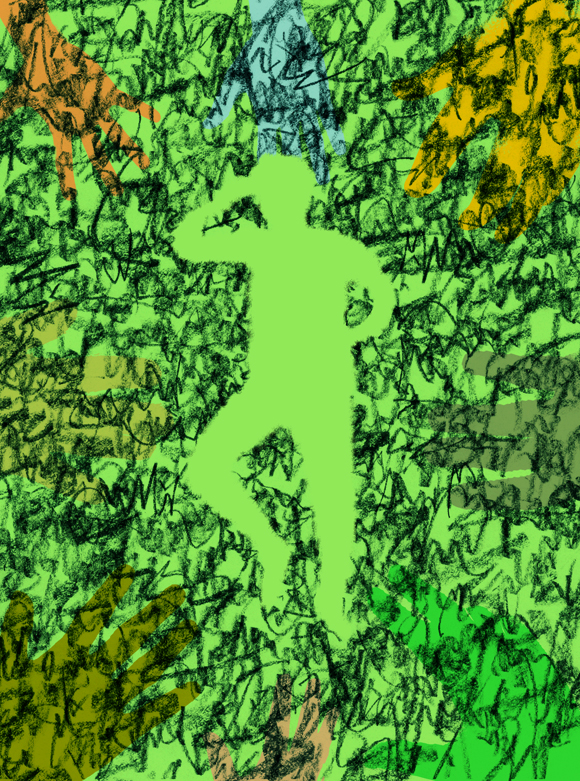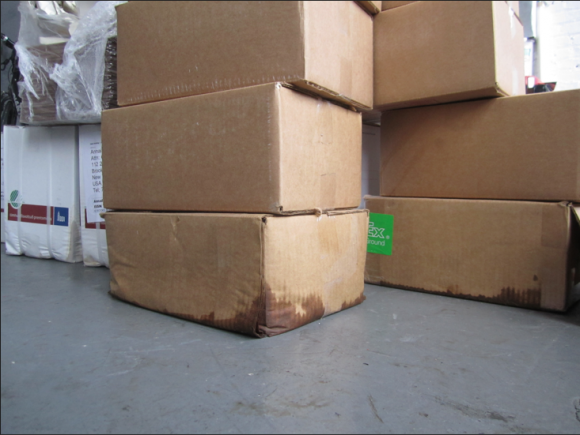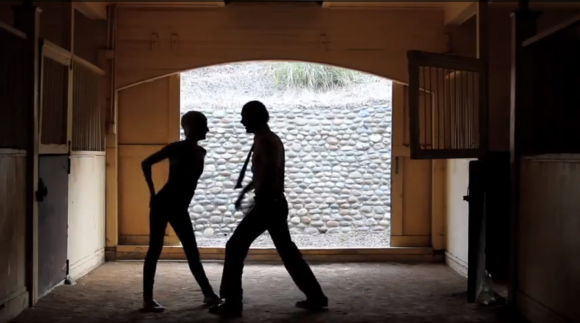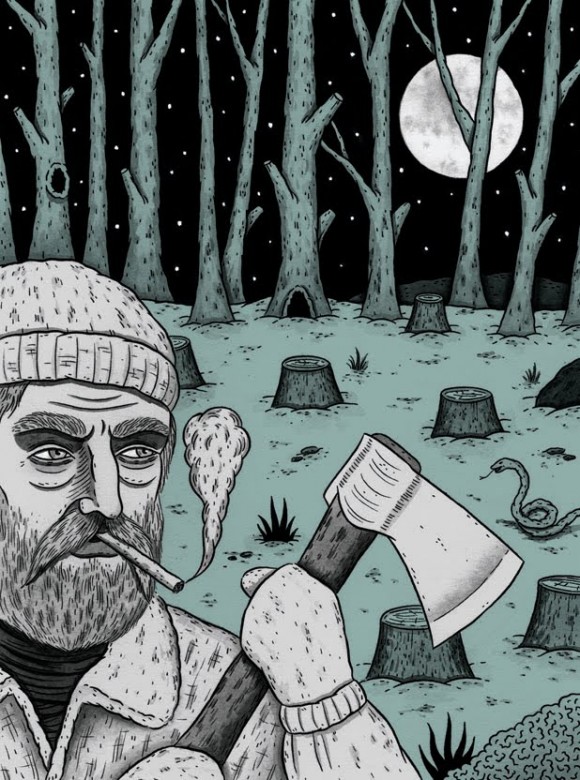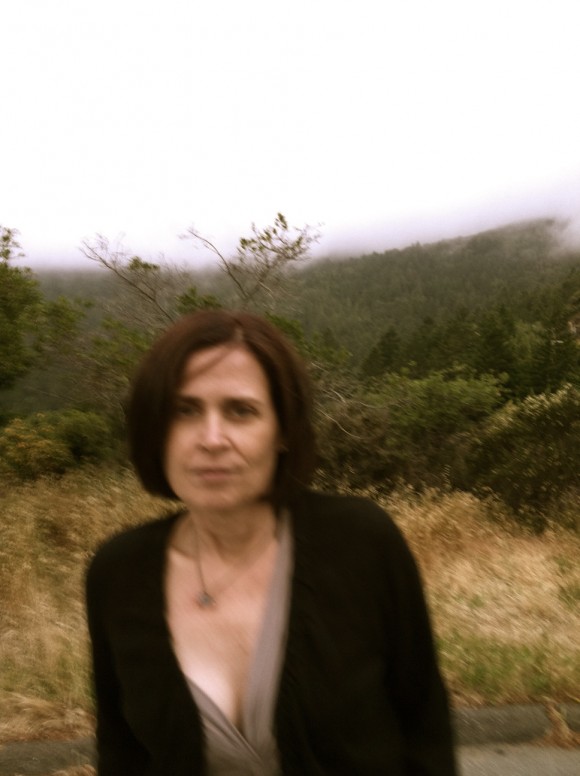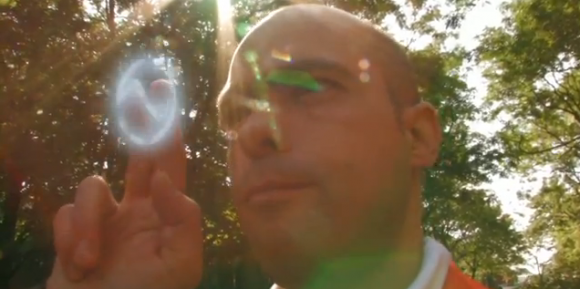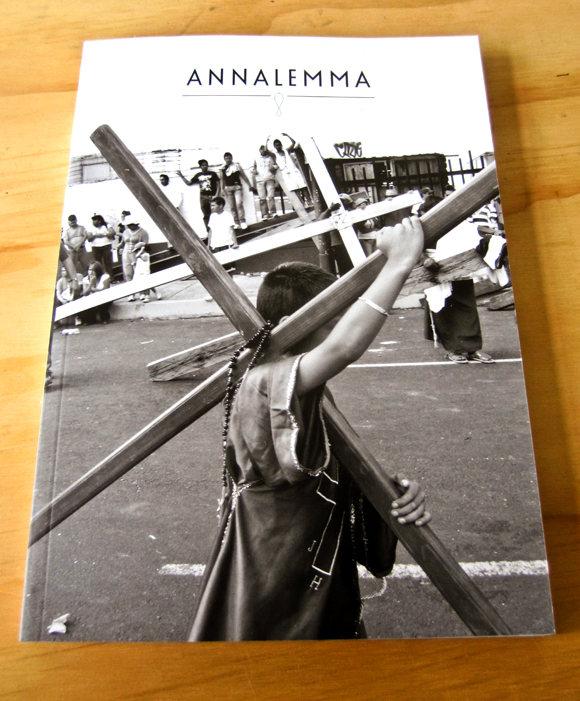{image by Walter Green, excerpted from the story “Golem” appearing in Issue Eight: Creation}
Issue Eight: Creation contributor DovBer Naiditch is many things: husband, father, writer, rabbi. He imbues all the things that encompass those roles into his writing. In his story “Golem” an old rabbi creates a mud golem for no particular reason who ends up doing menial tasks like yard work. The golem quickly begins to question his existence and take interest in a strange neighbor lady next door.
I had the chance to speak with Dov over gchat about religion, the search for truth, rabbinical studies and mud golems. Enjoy.
Annalemma: Hello Dov, are you there?
Dov Naiditch: Hey, yeah.
A: Great, are you good to chat for a little while?
DN: sure
A: Cool, so I ran into a friend of yours a few months back. I didn’t know you knew Sal Pane.
DN: Yeah, yeah. we were in class together. He’s a sweetheart. Justa kind of cool and open guy.
A: He’s a good dude, what school was that?
DN: University of Pittsburgh.
A: Are you still in the program there?
DN: No, I just graduated in the spring.
A: Congratulations, was it an MFA or undergrad?
DN: MFA in fiction.
A: How’d you like it?
DN: It was a very good program. I don’t have much else in comparison, besides for those charts people put out every now and again, but it gave me everything I needed from a good program.
A: I understand you’re a rabbi as well?
DN: Yes, yeah. I got my Rabbinate in a seminary in Israel.
A: Which came first, the desire to be a writer or a rabbi?
DN: Shoot, that’s a good question. I don’t know. Let me try and explain. First, I guess, to become a rabbi in the community I grew up in isn’t a huge deal, I think. It’s not really expressed as a calling or anything. Jewish law is very complex and intricate, and when your as deep in it as I am, it’s kind of a necessary prerequisite to become one. Many of my friends in my community, for example, have received their rabbinates (though some haven’t and make a point of not doing so).
That being said, my desire to become a rabbi ties very deeply into my expression of myself as a religious person, and so it’s a very central part of me. But then, my decision to become a writer has also been a central part of me. I remember writing in rabbinical school, little bits and scenes and segments of things that caught my eye, or constructing stories. And of course the two are far more intertwined than that. I mean, they both stem from a central desire to find and define G-d.
A: That’s really interesting. Do you teach or lead services?
DN: No. That kind of rabbi you might call a pulpit rabbi. I don’t have a congregation or a community. Rabbis in the most basic sense are qualified definers and determiners of religious obligation in all of its facets. A rabbi, in this sense, is much like a lawyer. He determines what situation is right or wrong (and not just moral situations, but structural situations as well)
If you’re familiar with Kashrut, for example, no mixing of milk and meat, no eating of pig. Well, what if you’re mixing a huge pot of milk and just a little grease from a steak falls in? Is it all bad? A rabbi is called to research the Talmud and additional texts to determine if indeed it is bad (in that particular case, if the grease is less than 1/60th of the milk, than you may still drink the milk). Stop me if I’m getting too off the path.
A: No way, I’m really interested in this stuff. I have a Christian background so I relate to people on a spiritual journey. I’m especially interested in ones that are different than mine. I never thought to draw the parallels between writers and students of religion. But at heart, it seems like they’re both diggers, trying to get to the truth of life.
DN: Hah, all I ever do is draw parallels. I mean, at it’s heart it’s telling stories. Both religion and writing.
A: Right, we’re all trying to determine the ‘how’ and ‘why’ of existence.
DN: Yes. I was at a reading once by A.S. Byatt and she said something about how the novel was the first truly agnostic form, that it arose from the 16th century reformation and ideas about finding G-d on your own, or questioning G-d’s means. Because to believe in G-d is to believe in the ultimate story, that there is a plot to all of this, that we are characters. And so to write, I think, to create your own story–to say, this is how it should be–is definitely an act of questioning.
But since G-d tells a story with us, and in telling stories we are creating in the image of G-d, then in some way in writing, we are creating ourselves in the image of G-d, and so it can be a mystical and reaffirming quality as well. At least, this is what I think.
A: That’s an interesting way to put it, most people from my faith would just call what I’m doing hethanistic secularism  Does your writing ever come into contention with your faith like that or do you get judged for those sorts of things?
Does your writing ever come into contention with your faith like that or do you get judged for those sorts of things?
DN: Most people in my faith would probably call it that, too. But I don’t do it for them. And hecks yeah, I get judged. And I’m sure some of it even comes from a good place. Or a place that wants to be good. But yeah, my writing does come into contention with my faith, all the time.
A: What do you do when that happens?
DN: I know it’s a good story.
A: Hahah
DN: Right?
A: Yeah.
DN: (Take) the act of charity, for example: there’s a lot of argument, in both of our faiths, about charity, because it is at it’s heart an implicit rejection of G-d’s design. When a man gives charity he’s saying G-d’s plan isn’t working. And he has to step in and fix it. It’s the ultimate form of hethanistic secularism. And yet it’s an essential part of all faiths. So what’s the deal?
A: Yeah, life is full of contradictions, religion being just one area, one garden of contradiction. Navigating them is the conflict. Therefore, it’s where the material is at for writers.
DN: Yeah. Although, honestly, in my writing I’m never nearly as absolute as I am in this conversation.
A: Haha, yeah it’s hard to be that forthright and hard lined in fiction. People most times don’t want that in fiction. So you kind of have to make your messages termites. There under the surface, a little bug digging through the readers brain.
DN: That’s a good analogy. [Ed. note: wish I could take credit for it]. But also, it helps not to have a message. Or to not know what it is yourself.
A: Right, it usually comes in the form of an impulse.
DN: Yeah. Nothing should be clean. If it’s clear cut, you’ve lost it. And that’s not just for your reader, I think, but for yourself.
A: Yeah, I think it goes back to the writer/theologian thing: we’re all diggers and even when we’ve found something that makes sense we still don’t stop digging. There’s always more to learn, more to know. The more our spheres of understanding grow, the more we learn that we know even less that we thought we did.
DN: Yeah. That’s a good way to put it. These are some of the things I don’t like about religion, the morality plays, the bows on top. The this is what we’ve learned (types of stories). They institutionalize inspiration.
A: I agree, it’s impossible to put a bow on the larger questions. I wanna steer this in a different direction before we run on too long. I wanted to talk to you about golems. They’re a re-occurring theme in literary fiction, why do you think that is?
DN: Shoot, again it’s about creation. But here it is a bit different. It’s about the not-quite-right, I think. At some point, I think, every writer writes something and says this feels so right but it’s not alive. It’s got everything in the right place, you know?
A: Right, like it doesn’t have a soul yet.
DN: And this is something we all come across. When I was trying to write more realistic fiction, to accurately describe my surroundings, I always felt that way. At some point it stopped being watching a frog jump around and started being dissecting it. So I gave up. Which isn’t to say that there aren’t writers out there who do it well. I’m very jealous of them, people who can put a soul in setting. Why do you think Golems are popular?
A: I think the idea is appealing to writers because a golem is a blank slate, you can make him whatever you need. And you’ve got a built in story already there that a lot of people know, so some of the legwork is done for you. Plus it’s just weird! A big mud man walking around.
DN: Hah
A: Such an evocative image, something that speaks to a need in our brains. A need for a protector, I guess. I don’t know, is that really offensive?
DN: I think you’re right though. Sadly, i guess. There is a desire in all of us to just have some one around to do whatever we want, a kind of primitive desire to lord it over others. Maybe a golem is just a socially acceptable thing to do so with.
A: What’d you think of how it was handled in The Amazing Adventures of Kavalier and Clay?
DN: Honestly, I hate to admit this, but I never read that book.
A: Dude. You gotta read that book.
DN: I know (Micheal Chabon) graduated from Pittsburgh, and I loved the Yiddish Policeman’s Union. I’ll get it this weekend.
A: It’s an incredible read, you won’t regret it.
DN: I know I won’t. I never do regret reading a novel someone suggests. It’s always the getting around to it that smarts.
A: Yeah, that happens with me too. The first 100 pages of some of my favorite books have been the hardest to get through.
DN: Right? I always promised myself that when I wrote a novel it would be exciting all the way through. I just read “Atmospheric Disturbances” by Rivkah Galchen and it was good overall. But man I had to grit my teeth through some chapters.
A: Did you find that the teeth gritting was worth it?
DN: In a way. It’s a novel that delivers the kind of vague impulse that short stories should deliver. In that way it makes very good. But also I felt like it could have been done in 12 pages.
A: Huh, that’s interesting. Sometimes novels are work, man. And I think that’s okay, a reader can usually sign on for work as long as it has a payoff. It’s got to have a payoff.
DN: That’s why I like Chabon. He knows a novel should have a payoff.
A: I think talking about payoffs is a good place to call it an interview. Thanks for talking to me Dov.
DN: Oh, man it’s been a pleasure. It’s nice to sit down and actually break down some of those thoughts that have been percolating for so long. Lets do this again. Maybe next time we can talk about the actual story ; )
A: Hah, you got a deal, great talking to you too. I’ll let you know when this thing posts, probably tomorrow or Thursday.
DN: Sweet. Be well. Great job with the magazine, by the way, I’m really honored to be in these pages with some of these awesome writers and artists.
A: Thanks man, glad we could have you, it’s a great story. I’ll be in touch.
Click here to check out Dov’s Story in Issue Eight: Creation.












